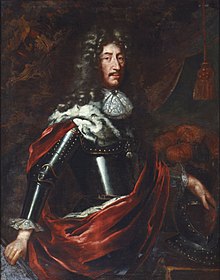Philip William, Elector Palatine
| Philip William | |
|---|---|
 Philip William in 1685 | |
| Elector Palatine | |
| Reign | 26 May 1685 – 2 September 1690 |
| Predecessor | Charles II |
| Successor | Johann Wilhelm |
| Count Palatine of Neuburg | |
| Reign | 14 September 1653 – 2 September 1690 |
| Predecessor | Wolfgang Wilhelm |
| Successor | Johann Wilhelm |
| Born | 24 November 1615 New Palace, Gießen |
| Died | 2 September 1690 (aged 74) Vienna |
| Burial | Neuburg an der Donau, Germany |
| Spouse | |
| Issue Detail | Eleonor Madeleine, Holy Roman Empress John William, Elector Palatine Wolfgang George Frederick von Pfalz-Neuburg Ludwig Anton von Pfalz-Neuburg Charles III Philip, Elector Palatine Alexander Sigismund, Bishop of Augsburg Francis Louis, Archbishop of Trier Frederick Wilhelm von Pfalz-Neuburg Maria Sophia, Queen of Portugal Maria Anna, Queen of Spain Philip William August, Count Palatine of Neuburg Dorothea Sophie, Duchess of Parma Hedwig Elisabeth, Princess Sobieski Countess Palatine Leopoldine Eleonora of Neuburg |
| House | Wittelsbach |
| Father | Wolfgang William, Count Palatine of Neuburg |
| Mother | Magdalene of Bavaria |
| Religion | Catholicism |
Philip William of Neuburg, Elector Palatine (German: Philipp Wilhelm) (24 November 1615[1] – 2 September 1690[2]) was Count Palatine of Neuburg from 1653 to 1690, Duke of Jülich and Berg from 1653 to 1679 and Elector of the Palatinate from 1685 to 1690. He was the son of Wolfgang Wilhelm, Count Palatine of Neuburg and Magdalene of Bavaria.
Life
[edit]In 1685, with the death of his Protestant cousin, the Elector Palatine Charles II, Philip William inherited the Electorate of the Palatinate, which thus switched from a Protestant to a Catholic territory.[3] Charles II's sister, now the Duchess of Orléans and Louis XIV's sister-in-law, also claimed the Palatinate.[4] This was the pretext for the French invasion in 1688, which began the Nine Years War.
Marriages
[edit]Philip William married twice. He first married Princess Anna Catherine Constance Vasa, daughter of Sigismund III Vasa and Constance of Austria.[5] The couple had a son who died at birth. Anne Catherine Constance herself died in 1651.
In 1653 Philipp Wilhelm married Elisabeth Amalie of Hesse-Darmstadt.[6] This second marriage lasted 37 years and was regarded as extremely happy. They had 17 children,[7] including the next two Palatine Electors, John William and Charles III Philip, as well as Elector-Archbishop Franz Ludwig von Pfalz-Neuburg. Many of these children have descendants today. In the early years of their marriage, the couple lived in Düsseldorf, where they founded churches and monasteries.
| Issue | ||||||||||||||||||||||||||||||||||||||||||||||||||||||||||||||||||||||||
|---|---|---|---|---|---|---|---|---|---|---|---|---|---|---|---|---|---|---|---|---|---|---|---|---|---|---|---|---|---|---|---|---|---|---|---|---|---|---|---|---|---|---|---|---|---|---|---|---|---|---|---|---|---|---|---|---|---|---|---|---|---|---|---|---|---|---|---|---|---|---|---|---|
|
Ancestry
[edit]| Ancestors of Philip William, Elector Palatine | |||||||||||||||||||||||||||||||||||||||||||||||||||||||||||||||||||||||||||||||||||||||||||||||||||||||||||||||||||||||||||||||||||||||||||||||||||||||||||||||||||||||||||||||||||||||||||||||||||||||||||||||||||||||||||||||||||||||||||||||||||||||||||||||||||||||||||||||||||||||||
|---|---|---|---|---|---|---|---|---|---|---|---|---|---|---|---|---|---|---|---|---|---|---|---|---|---|---|---|---|---|---|---|---|---|---|---|---|---|---|---|---|---|---|---|---|---|---|---|---|---|---|---|---|---|---|---|---|---|---|---|---|---|---|---|---|---|---|---|---|---|---|---|---|---|---|---|---|---|---|---|---|---|---|---|---|---|---|---|---|---|---|---|---|---|---|---|---|---|---|---|---|---|---|---|---|---|---|---|---|---|---|---|---|---|---|---|---|---|---|---|---|---|---|---|---|---|---|---|---|---|---|---|---|---|---|---|---|---|---|---|---|---|---|---|---|---|---|---|---|---|---|---|---|---|---|---|---|---|---|---|---|---|---|---|---|---|---|---|---|---|---|---|---|---|---|---|---|---|---|---|---|---|---|---|---|---|---|---|---|---|---|---|---|---|---|---|---|---|---|---|---|---|---|---|---|---|---|---|---|---|---|---|---|---|---|---|---|---|---|---|---|---|---|---|---|---|---|---|---|---|---|---|---|---|---|---|---|---|---|---|---|---|---|---|---|---|---|---|---|---|---|---|---|---|---|---|---|---|---|---|---|---|---|---|---|---|---|---|---|---|---|---|---|---|---|---|---|---|---|---|---|---|
| |||||||||||||||||||||||||||||||||||||||||||||||||||||||||||||||||||||||||||||||||||||||||||||||||||||||||||||||||||||||||||||||||||||||||||||||||||||||||||||||||||||||||||||||||||||||||||||||||||||||||||||||||||||||||||||||||||||||||||||||||||||||||||||||||||||||||||||||||||||||||
External links
[edit]![]() Media related to Philip William, Elector Palatine at Wikimedia Commons
Media related to Philip William, Elector Palatine at Wikimedia Commons
References
[edit]- ^ Förch, F. A. (1860). Neuburg und seine fürsten: ein historischer versuch als beitrag zur geschichte des fürstenthums Pfalz-Neuburg (in German). A. Prechter. p. 93. Retrieved 3 February 2024.
- ^ Baroggio, Jakob (1861). Die Geschichte Mannheims von dessen Entstehung bis 1861 (in German). Selbstverl. p. 152. Retrieved 3 February 2024.
- ^ Laurier, Fr W. (1868). Die evangelisch-protestantische Kirche der Pfalz: Eine Denkschrift zur fünfzigjährigen Jubelfeier der pfälzischen Union am 2. August 1868. Von Fr. W. Laurier (in German). Tascher. p. 27. Retrieved 3 February 2024.
- ^ Whaley, Joachim (2012). Germany and the Holy Roman Empire: Volume II: The Peace of Westphalia to the Dissolution of the Reich, 1648-1806. OUP Oxford. p. 47. ISBN 978-0-19-969307-8. Retrieved 3 February 2024.
- ^ Kontler, Laszlo; Somos, Mark (25 September 2017). Trust and Happiness in the History of European Political Thought. BRILL. p. 146. ISBN 978-90-04-35367-1. Retrieved 4 February 2024.
- ^ BAYERLE, B. G. (1844). Die katholischen Kirchen Düsseldorf's von ihrer Entstehung bis auf die neueste Zeit. Ein Beitrag zur Geschichte der Stadt (in German). Schreiner und Roschütz. p. 68. Retrieved 4 February 2024.
- ^ Anderson, Roberta; Santaliestra, Laura Oliván; Suner, Suna (16 April 2021). Gender and Diplomacy: Women and Men in European Embassies from the 15th to the 18th Century. Hollitzer Wissenschaftsverlag. p. 152. ISBN 978-3-99012-835-0. Retrieved 4 February 2024.
- ^ Beiträge zur Geschichte des Niederrheins: Jahrbuch des Düsseldorfer Geschichtsvereins (in German). Der Verein. 1888. p. 42. Retrieved 4 February 2024.














